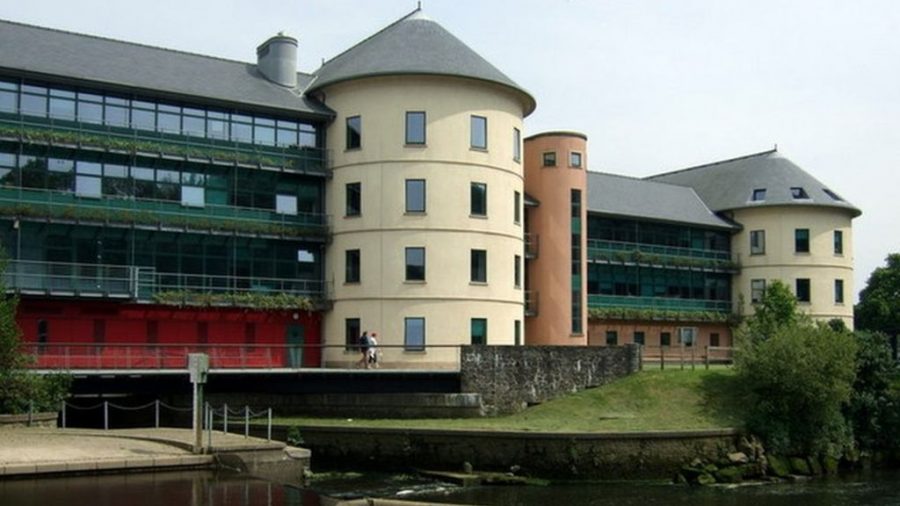News
Council’s rubbish plan goes ahead
 THE COUNTY COUNCIL has given the go ahead to controversial plans to cut domestic rubbish collections. The Council’s scheme, to change from a weekly to a fortnightly collection for black bag rubbish, was this week rubber-stamped by the Council’s IPPG Cabinet.
THE COUNTY COUNCIL has given the go ahead to controversial plans to cut domestic rubbish collections. The Council’s scheme, to change from a weekly to a fortnightly collection for black bag rubbish, was this week rubber-stamped by the Council’s IPPG Cabinet.
The new regime, affecting black bag and glass waste, will be introduced in October.
Irate residents and concerned local Councillors have already voiced their fears that the changes are potentially hazardous. Questioned have been raised about the wisdom of the Cabinet’s decision and the impact it will have on the people of Pembrokeshire. Some Councillors are unconvinced that the cut in services was implemented to meet Welsh Government recycling targets, as the Council has claimed.
Speaking to The Herald, Councillor Huw George, Cabinet Member for Environment and Regulatory Services, claimed that fortnightly collections would reduce costs by an estimated £500,000 a year. In response to the question of whether or not this saving would be passed on as a rebate to residents who have already been billed for this year’s Council Tax, Cllr. George stated that:
“With regards to the question in respect of a reduction in Council Tax, you should be aware that the vast majority of funding for Pembrokeshire County Council services comes through the Welsh Government and they have announced very significant cuts to our income for future years, with greater reductions likely to come. We do therefore need to take some difficult decisions about the services we deliver and how we do so in order that we can continue to operate within the reduced budget available to us.”
He went on to say, “As you will be aware, the orange recycling bags and the food waste will continue to be a weekly service. Typically, over 70% of all domestic household waste is recyclable, which actually means that if someone is fully using the recycling services they will have less black bag waste to store over a fortnight than they were previously generating in a week. There is no compunction upon individual householders to recycle but, clearly it is their choice if they wish to minimize the amount of waste they have to store for up to two weeks.”
Lyndon Frayling, vice chairman of the Environment Overview and Scrutiny Committee, supported the new policy saying, “I make no apologies for doing so. This decision will help us achieve the huge savings we need to make (like every Council in the country) and make it easier to make the tough recycling targets set by the Welsh (Labour) Government. It will mean a change of routine for people but if the rest of Wales can cope with fortnightly collections, I do not believe it is beyond the scope of Pembrokeshire householders to do so as well.”
One angry parent, who wished to remain unnamed, spoke to The Herald by stating that she would face storing soiled nappies for up to two weeks in a small flat. Liberal Democrat Councillor for Dinas Cross, Bob Kilminster picked up her point:
“My biggest concern is for the large number of adults who receive social care packages and have to use incontinence or sanitary wear on a daily basis. These people are, by their conditions, rarely mobile and rely on the refuse collection service to dispose of the products they have to use on a regular basis. Going to a two week collection for these people may well cause huge problems. We could even experience increased social care costs as a result of this.”
Castle Ward resident, Dave Chalker, expressed his fear of a return to the scenes witnessed during the 1970s during the so-called ‘Winter of Discontent’, with rubbish building up in people’s yards and gardens, causing smells that could encourage scavengers and vermin.
That view was supported by Sarah Llewellyn, Town Councillor for Castle Ward, who was sceptical about the value of the policy as a cost cutting measure. She told The Herald, “I would have thought this is a real backward step. Many householders simply do not have the space to store their household waste for prolonged periods or the means to make journeys to the nearest civic amenity sites. Who is going to clear up the mess, and at what cost?”
The Herald sought a response from Keep Wales Tidy on the issue of the carbon footprint left by motorists making additional trips to municipal sites but, even though the action group’s website states they ‘research environmental issues and identify good practice at a local and national level’, they took the position that they were ‘declining to comment because it is a local authority issue’.
A Garth Ward resident, who wished to remain anonymous, was more forthcoming in her criticism of the idea of transporting waste to a municipal refuse tip, saying, “I’m so angry. How is a mother with no car supposed to just take their rubbish to a tip some miles away? In a pram? On the bus? It is ridiculous. I will simply find the nearest area for communal weekly collection and leave it there”.
On this point Councillor David Howlett, Conservative, attempted to reassure constituents by stating that, “At last week’s meeting of the Environment Committee, concern was expressed in relation to sanitary waste, and we voted on an amended proposal that will mean this aspect will be given further consideration. Also, I understand that for certain flats and multi-occupancy properties that do not currently have food and glass collections, they will continue with weekly black bin bag collections until a solution is found.”
Councillor David Bryan, of Haverfordwest Priory ward, who supported the shift to fortnightly collections, commented on this issue, saying that, “The only caveat that is needed is that there must be consideration given to the particular problems concerned with multi occupied properties and the need to collect soiled disposable nappies. It is also extremely important that weekly food refuse collections should be retained.”
Lyndon Frayling, Councillor for Garth Ward, stated that flats and multi-occupancy properties are not affected. However, when pressed on how the Council defined multi occupancy properties, in light of the fact that several housing estates have communal collection points for multiple households, he failed to respond.
Councillor Huw George further explained the need for voters to take personal responsibility, saying, “We do acknowledge that there will be varying levels of inconvenience for some households but this can be minimized by increasing the amount recycled and as we have seen from other areas across Wales, people do adapt their habits and do cope. I do not accept that if the rest of Wales can successfully introduce fortnightly collections for the black bag rubbish that Pembrokeshire cannot also do the same, but I appreciate that it will be more difficult for some than others”.
On the issue of transportation of refuse he merely stated that, “If an individual does have more waste than they can store between collections on any particular occasion then they will still be able to take their rubbish to their nearest civic amenity and recycling centre, but obviously they would have to get it there”.
Thomas Tudor and Paul Miller, from the Labour Group, both confirmed their support of the new policy, stating it was intended to encourage recycling, whilst acknowledging the resulting difficulties it would pose, promising electors that the situation would be monitored with an expectation that it should be ‘working’ in six months’ time.
Two Councillors expressing grave concerns over this issue were Vivien and Mike Stoddart, of Hakin and Hubberston respectively, who, speaking exclusively to The Herald, issued the following statement,
“We have expressed our concern to the County Council about the impact of fortnightly black bin bag collections on our constituents, particularly those living in flats and multi-occupancy properties. We have many such properties in our wards. Fortnightly collections of black bags (residual waste which, for family households, is a euphemism for nappies and sanitary waste) will bear down especially hard on our constituents, as storing this waste will be a problem for families living in flats. At the urging of a few opposition Councillors, the Council has agreed to consider the arrangements for dealing with sanitary waste, but the Council has also stated they will not provide additional collections; nor will they provide wheelie bins. So, we are not sure what these arrangements might be and if they will solve the problem for our families”.
Both Councillors, as of Wednesday of this week, were awaiting assurances from Cllr George that face to face contact would take place between flat dwellers, landlords and Council to ensure provision of suitable storage space.
Only last year, Eric Pickles, speaking as Secretary of State for Communities and Local Government, described weekly collections as a ‘basic right’ and accused Councils that were reducing the frequency of collections as actions which were both ‘lazy and unnecessary”.
From October 14th 2013 Pembrokeshire residents will have no choice but to see how this shift in policy affects them, their families, their neighborhood and their well-being.
Crime
Former Wales rugby star admits Christmas Day drink-driving offence

Ex-Ospreys captain was almost twice over limit in Pembroke town centre
Former Wales back row Jonathan Thomas has admitted driving through Pembroke town centre on Christmas Day when he was almost twice over the drink-drive limit.
This week Haverfordwest magistrates heard that Thomas, 43, was stopped by officers as he drove his Mercedes CLA 220 along The Green, Pembroke, at around 5pm on Christmas Day.
“The officers were very concerned at the manner of his driving, as the car was being driven erratically and was swerving to the other side of the road,” said Crown Prosecutor Sian Vaughan.
“When Jonathan Thomas got out of the car, the officers could see that he was having difficulty standing and was unsteady on his feet.”
Subsequent breathalyser tests showed Thomas had 62 mcg of alcohol in his system, the legal limit being 35.
Thomas, who has no previous convictions, pleaded guilty to the drink-drive charge and was represented in court by solicitor Jess Hill.
“He has family in the area and had travelled to spend time with them on Christmas Day,” she told the magistrates. “He’s very remorseful for his actions and hugely regrets his decision that day.”
Jess Hill concluded by saying that Thomas is currently “between jobs and living off his savings”.
Thomas, who gave his address as Main Road, Bredon, was disqualified from driving for a total of 18 months.
“The length of your disqualification reflects the fact that you were more than a little bit over the limit,” commented the presiding magistrates when imposing sentence.
He was fined £120 and ordered to pay £85 costs and a £48 court surcharge.
The former Wales back row left his role as Swansea RFC head coach at the beginning of December 2025 as a result of ongoing health concerns. He was forced to retire from playing in 2015 on medical advice after being diagnosed with epilepsy and is one of the 390 former rugby union players currently taking part in a concussion lawsuit against the sport’s authorities.
“Long-standing issues linked to the head trauma have caused me some concern recently and it has been impossible for me to give the role everything it needs,” he said in a previous interview with the BBC.
His rugby career started out with Pembroke RFC juniors before moving to Swansea RFC, which he captained when he was 19. He then joined the Ospreys where, over a ten-year period, he won four league titles and an Anglo-Welsh Cup. He was the youngest player to captain the Ospreys and, at the time of leaving, was the joint highest appearance holder, together with Andrew Bishop, on 188 appearances.
His international career saw him play for Wales at Under-16, Youth, Under-19, Under-21 and Sevens levels. He made his senior international debut against Australia in 2003, featured at the 2007 Rugby World Cup and was part of two Six Nations Grand Slam-winning sides in 2005 and 2008. Between 2004 and 2011, Thomas was included in every Wales Six Nations squad. In his appearances for Wales, he scored seven tries.
Local Government
Independent panel gives positive verdict on Pembrokeshire County Council

Four-day assessment highlights improvement, leadership and governance
AN INDEPENDENT panel has concluded that Pembrokeshire County Council is meeting its statutory performance requirements and has shown improvement across a number of key areas.
The findings follow a four-day visit in October 2025, when a group of external peers carried out a Panel Performance Assessment (PPA), a process required once every electoral cycle under Welsh Government legislation.
The purpose of the PPA is to provide an independent expert view on how effectively the council is using its functions, how it deploys resources, and whether its governance arrangements are fit for purpose.
The four-member panel was led by Phil Roberts, independent chair and former chief executive of Swansea Council. Other members were Cllr Anthony Hunt, leader of Torfaen Council; Emma Palmer, chief executive of Powys Council; and Andrea Street OBE, representing the public, private and voluntary sectors.
In its final report, the panel concluded that Pembrokeshire County Council is meeting its statutory requirements and commented favourably on many aspects of its work. The authority was described as effective, having responded well to a challenging financial position and demonstrated improvement in a number of key areas.
Among the report’s findings was praise for “a cohesive cabinet, which despite its rainbow coalition arrangements, exercises a model of distributed leadership which is particularly effective”. The panel also highlighted “a committed Senior and Extended Leadership Team who recognised the journey of improvement the council has been on under the Chief Executive’s strong leadership”.
The panel further noted “a broad set of values and behaviours consistently demonstrated across the organisation, from the Senior Leadership Team to frontline staff”, adding that there was “a genuine desire to work in the interests of the communities and residents of the county”.
While the overall assessment was positive, the report also identified areas where further progress could be made. Seven recommendations were set out, covering scrutiny arrangements, corporate capacity, collaborative leadership, economic regeneration capacity, resource prioritisation, communications, and transformation and innovation.
Council leader Jon Harvey welcomed the report, describing the assessment as a constructive experience.
“This was an extremely positive experience for the council, and an opportunity to learn and benefit from the views and perspectives of independent experts from outside the authority,” he said. “We welcome the assurance provided by the panel that we are on the right track, and the feedback which has helped to identify opportunities and areas for improvement.”
Cllr Harvey also thanked panel members for their work, along with officers from the Welsh Local Government Association who supported the assessment process.
“We accept the panel’s findings in full and I am convinced that the action plan we have developed in response to the recommendations will enable us to further strengthen key areas of our work so we can continue to provide quality services to our residents and communities,” he added.
In line with legislation, the council has produced a formal response and action plan setting out how it will address the panel’s recommendations. These will be presented to Cabinet on February 9 and to full council on March 5 for formal approval.
News
Kurtz calls on Labour MPs to back release of Mandelson papers

Opposition motion follows Epstein-linked document disclosures
A SENEDD Member has called on Labour MPs to support a Conservative Opposition Day Motion demanding the release of papers linked to Peter Mandelson’s appointment as the UK Ambassador to the United States.
Samuel Kurtz said the motion follows the publication of new files and photographs involving Lord Mandelson, which were released as part of a United States investigation into the disgraced and convicted child sex offender Jeffrey Epstein.
Speaking out, Mr Kurtz said that during Prime Minister’s Questions, the Prime Minister admitted he was aware of Peter Mandelson’s ongoing relationship with Epstein at the time of his appointment.
“That means the Prime Minister knowingly appointed Peter Mandelson to one of the most important diplomatic roles in government despite his links to Epstein,” he said. “This raises serious questions about the Prime Minister’s judgement.”
Mr Kurtz went on to accuse the Prime Minister of attempting to prevent transparency over the appointment process.
“Now, instead of being open and transparent, the Prime Minister is attempting to block the release of documents relating to Mandelson’s appointment in order to protect his own position,” he said.
He warned that Labour MPs who oppose the motion would share responsibility for withholding information, adding: “If Labour MPs support blocking the release of these papers, they will be complicit in covering up the process and judgement that led the Prime Minister to appoint Peter Mandelson as Ambassador, despite his friendship with Jeffrey Epstein.”
-

 Health6 days ago
Health6 days agoConsultation reveals lack of public trust in health board
-

 Community7 days ago
Community7 days agoPembrokeshire students speak at national Holocaust Memorial Day event
-

 News1 day ago
News1 day agoPrincess of Wales visits historic Pembrokeshire woollen mill
-

 Crime5 days ago
Crime5 days agoPembroke man accused of child sex offences sent to Swansea Crown Court
-

 Community6 days ago
Community6 days agoCampaign to ‘save’ River Cleddau hits over 2,200 signatures
-

 Health3 days ago
Health3 days agoDoctor struck off after sexual misconduct findings at Withybush Hospital
-

 Crime7 days ago
Crime7 days agoFormer soldier jailed for stalking police officer over past arrest
-

 News7 days ago
News7 days agoWelsh Conservatives push for reversal of 20mph limit and major road spending

























